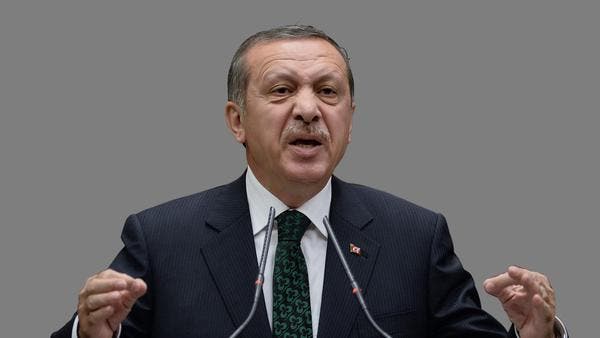
Turkey's Prime Minister Recep Tayyip Erdogan voiced support of the January 2011 Egyptian revolution. (File photo: AP)
Mohamed Hamed - Al Arabiya Institute for Studies
Turkey supported the Egyptian people's demands of freedom and
democracy during the January 2011 revolution. Recep Tayyip Erdogan stood
in the Turkish parliament and voiced support of the revolution and said
the rule of Hosni Mubarak was not democratic.
Turkish president Abdullah Gul visited Egypt after Mubarak was ousted on February 11. He met with the Muslim Brotherhood supreme guide, indicating the strength of the Brotherhood's relations with the Turkish regime. At the time, Egyptian civil and political parties had reservations over this.
Ties between Turkey and the Brotherhood were further strengthened at the end of 2011, when Erdogan visited Cairo and was warmly greeted by Brotherhood supporters. Yet Erdogan was criticized by the Brotherhood when he requested establishing a secular constitution. A Brotherhood official said the party did not need Erdogan's advice.
Mursi visited Turkey and attended the annual conference of the ruling Justice and Development Party. Analysts in Egypt were taken by surprise as to how a president could attend the conference of a political party in another country.
Erdogan visited Cairo and delivered a speech in Cairo University. He said: "I await the writing of the Egyptian constitution so we take it as an example in Turkey."
After the constitutional declaration on November 21, 2012, some Egyptians were furious at the 'dictatorial' declaration. Dozens were killed in clashes between supporters and opponents of the constitution. Despite the police's violent suppression of the protests opposing the constitution, the Turkish regime kept silent.
The constitution was approved and Egyptian officials kept going back and forth to Turkey. Khairat al-Shater and other Brotherhood businessmen visited the Turkish capital to seal deals. Egypt's defense minister went to Turkey in May 2013.
Then the Taksim protests happened in Turkey, predating the June 30 events in Egypt. The Turkish police confrontation of the protests was similar to the Egyptian police's confrontation of the January revolution. The reactions of Turkish officials were similar to those of the Arab Spring deposed presidents whom Erdogan repeatedly criticized.
Protesters called for early presidential elections. The regime ignored the people who took to the street, estimated at 30 million. The Egyptian army found itself obliged to meet the people's aspiration of ousting Mursi. So the army announced a roadmap for the duration of nine months.
The Turkish stance towards Egypt was similar to that of the Brotherhood and its allies. Erdogan led a fierce campaign against Egypt and described the June 3o events as a military coup. He also requested the U.N. and the Security Council to hold a consultative session on the Middle East with focus on the Egyptian crisis. He also incited Turkish and international rights organizations to pursue, as he claims, the criminals of the coup. He summoned Turkey's ambassador to Egypt for consultations. The Egyptian state did the same. Then Egypt decided to suspend naval maneuvers between the Turkish and the Egyptian armies in protest to Turkey's practices towards Egypt and in protest to Turkey's interference in Egyptian affairs.
Turkey also hosted the international organization of the Brotherhood group's meetings twice since June 30 in order to formulate alternative plans to save the Brotherhood in Egypt. Erdogan's actions stirred Egyptians' anger as he ignored the popular will of officially ousting Mursi after the popular uprising.
Turkey prioritized its relations with the Brotherhood over those with the Egyptian people and state. This stance, headed by Erdogan, was honorable during the January 25 revolution. But after the June 30 revolution, it appears biased. Erdogan's stance creates problems and feeds extremism - and will almost certainly see him lose popular support, not only in Egypt but also in Turkey.
Turkish president Abdullah Gul visited Egypt after Mubarak was ousted on February 11. He met with the Muslim Brotherhood supreme guide, indicating the strength of the Brotherhood's relations with the Turkish regime. At the time, Egyptian civil and political parties had reservations over this.
Ties between Turkey and the Brotherhood were further strengthened at the end of 2011, when Erdogan visited Cairo and was warmly greeted by Brotherhood supporters. Yet Erdogan was criticized by the Brotherhood when he requested establishing a secular constitution. A Brotherhood official said the party did not need Erdogan's advice.
Turkey and the presidency of Mohammad Mursi
The former president Mohammad Mursi assumed his post on June 30, 2012. The Turkish role appeared to be an influential factor during Mursi's governance. The Turkish regime, led by Erdogan, began its support for Mursi by granting a $2 billion loan to the Egyptian Central Bank.Mursi visited Turkey and attended the annual conference of the ruling Justice and Development Party. Analysts in Egypt were taken by surprise as to how a president could attend the conference of a political party in another country.
Erdogan visited Cairo and delivered a speech in Cairo University. He said: "I await the writing of the Egyptian constitution so we take it as an example in Turkey."
After the constitutional declaration on November 21, 2012, some Egyptians were furious at the 'dictatorial' declaration. Dozens were killed in clashes between supporters and opponents of the constitution. Despite the police's violent suppression of the protests opposing the constitution, the Turkish regime kept silent.
The constitution was approved and Egyptian officials kept going back and forth to Turkey. Khairat al-Shater and other Brotherhood businessmen visited the Turkish capital to seal deals. Egypt's defense minister went to Turkey in May 2013.
Then the Taksim protests happened in Turkey, predating the June 30 events in Egypt. The Turkish police confrontation of the protests was similar to the Egyptian police's confrontation of the January revolution. The reactions of Turkish officials were similar to those of the Arab Spring deposed presidents whom Erdogan repeatedly criticized.
Turkey's stance on the June 30 revolution
The Brotherhood's failure in the political sphere led to massive numbers of Egyptians taking to the street on June 30, 2013.Protesters called for early presidential elections. The regime ignored the people who took to the street, estimated at 30 million. The Egyptian army found itself obliged to meet the people's aspiration of ousting Mursi. So the army announced a roadmap for the duration of nine months.
The Turkish stance towards Egypt was similar to that of the Brotherhood and its allies. Erdogan led a fierce campaign against Egypt and described the June 3o events as a military coup. He also requested the U.N. and the Security Council to hold a consultative session on the Middle East with focus on the Egyptian crisis. He also incited Turkish and international rights organizations to pursue, as he claims, the criminals of the coup. He summoned Turkey's ambassador to Egypt for consultations. The Egyptian state did the same. Then Egypt decided to suspend naval maneuvers between the Turkish and the Egyptian armies in protest to Turkey's practices towards Egypt and in protest to Turkey's interference in Egyptian affairs.
Turkey also hosted the international organization of the Brotherhood group's meetings twice since June 30 in order to formulate alternative plans to save the Brotherhood in Egypt. Erdogan's actions stirred Egyptians' anger as he ignored the popular will of officially ousting Mursi after the popular uprising.
Turkey prioritized its relations with the Brotherhood over those with the Egyptian people and state. This stance, headed by Erdogan, was honorable during the January 25 revolution. But after the June 30 revolution, it appears biased. Erdogan's stance creates problems and feeds extremism - and will almost certainly see him lose popular support, not only in Egypt but also in Turkey.

For
No comments:
Post a Comment